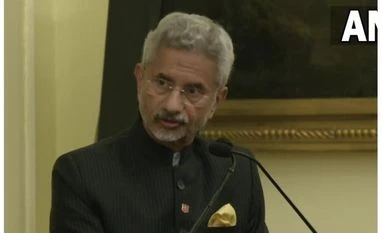India to take up affordability of energy, foodgrains issue at G20 strongly
External Affairs Minister S Jaishankar underlined that during G20 presidency, India intends to take up issue of affordability and accessibility to energy, foodgrains and fertilisers "very strongly"
)
Photo: Twitter
External Affairs Minister S Jaishankar on Friday underlined that during its G20 presidency, India intends to take up the issue of affordability and accessibility to energy, foodgrains and fertilisers "very strongly" as the economies of the Global South have been impacted.
India formally assumed the G20 Presidency on December 1. The next G20 Leaders' Summit at the level of Heads of State/Government is scheduled to be held on September 9 and 10 next year in New Delhi.
Addressing a business event here, Jaishankar, who is on his first official visit to Cyprus as India and Cyprus celebrate 60 years of diplomatic relations, noted that the efficiency and the delivery of global supply chains is a common concern today for all countries in the world.
Today the affordability and accessibility to energy, foodgrains and fertilisers is "not just our concern...it's a larger concern in the Global South. And it's certainly a worry that we intend to take up very strongly during the presidency of the G20 which we have taken on the first of December," he said.
The conflict in Ukraine has halted farming and the export of agriculture that much of the world is reliant on. The consequence of the shortage has seen surges in inflation with staples such as vegetable oil and sugar up by more than 50 percent. The war has also generated a sharp increase in energy prices and significant volatility in energy markets.
Also Read
Jaishankar said India is also working on using the G20 presidency to tackle the climate change issue.
Noting that the climate action issue is a common concern across the globe, the last few years, he said, "have actually brought home to each one of us that this is not a hypothetical threat. This is not something which we said would happen one day in the future...I think for fragile topographies, it (the climate change issue) is of growing concern".
Jaishankar said as a country which is home to 17 per cent of the world's population, India today contributes about 5 per cent of the world's emissions but "our commitment to tackling climate change is 100 per cent".
"We have led not just by expanding massively our renewables at home, one of the big initiatives we are currently working on is to use the G20 presidency to advance that is actually to advocate the change in lifestyle," he said.
Jaishankar said Prime Minister Narendra Modi also feels very strongly that changing lifestyles would actually make a big difference to the environment.
The minister said India has also been a leader in two international initiatives -- the International Solar Alliance and the Coalition for Disaster Resilient infrastructure.
At a time when global pressures are taking the world away from the Paris climate commitments and away from the agenda 2030 Sustainable Development commitments, India is staying true to both of them.
"Among the G20 countries, we are on course to deliver before time on whatever we have agreed to do in the Paris agreement," he said.
Jaishankar said there are seven areas of cooperation that India and Cyprus should examine between themselves.
"One, of course, is the world of finance...because Cyprus is an important pathway for financial flows into India. And if you're looking at an economy, which is going to grow at six-and-a-half per cent plus...we are a partner of growing relevance," he said.
The second area is shipping, Jaishankar said, because India is doing everything not just to transform it into a stronger manufacturing power, but also a more competitive agricultural export.
"So there will be many more products going out of India, and given the rate of growth that I'm placing before you coming into India," he said.
The third area of cooperation is tourism. "The coming wave will be of Indian tourists," Jaishankar said.
The fourth area of cooperation is the knowledge economy.
"My fifth point is we will have to promote a culture of mobility. In a world where there is demand will not necessarily be where there is a demographic advantage. So, how do we even out the demographics and the demand? I think this is going to be a big challenge.
"Today with a number of members of the European Union, we are negotiating mobility and migration agreements. We have done this successfully with Portugal, Denmark, France and Germany...what I want to emphasise is that today India is a source of talent and skills. And in a world of globalised and knowledge-driven economy, I think those flows are something which we need to address," Jaishankar said.
Jaishankar said given how comfortable India and Cyprus are with each other, it's also worth giving a thought of working together in a third country, possibly in Africa, or maybe in other parts of the world, where both New Delhi and Nicosia have some historical presence.
And finally, the minister said, he wants to drive home the point that the Mediterranean is a region of growing interest to India.
"As a foreign minister of a country that is globalising very rapidly and whose footprints, interests and influence will expand with time...And as it does so...this (Mediterranean) is a region where there will certainly be more of India. And when that happens, and as that happens for us, the relationship with Cyprus is something which will be an anchor in that respect," he said.
(Only the headline and picture of this report may have been reworked by the Business Standard staff; the rest of the content is auto-generated from a syndicated feed.)
More From This Section
Don't miss the most important news and views of the day. Get them on our Telegram channel
First Published: Dec 30 2022 | 9:38 PM IST


